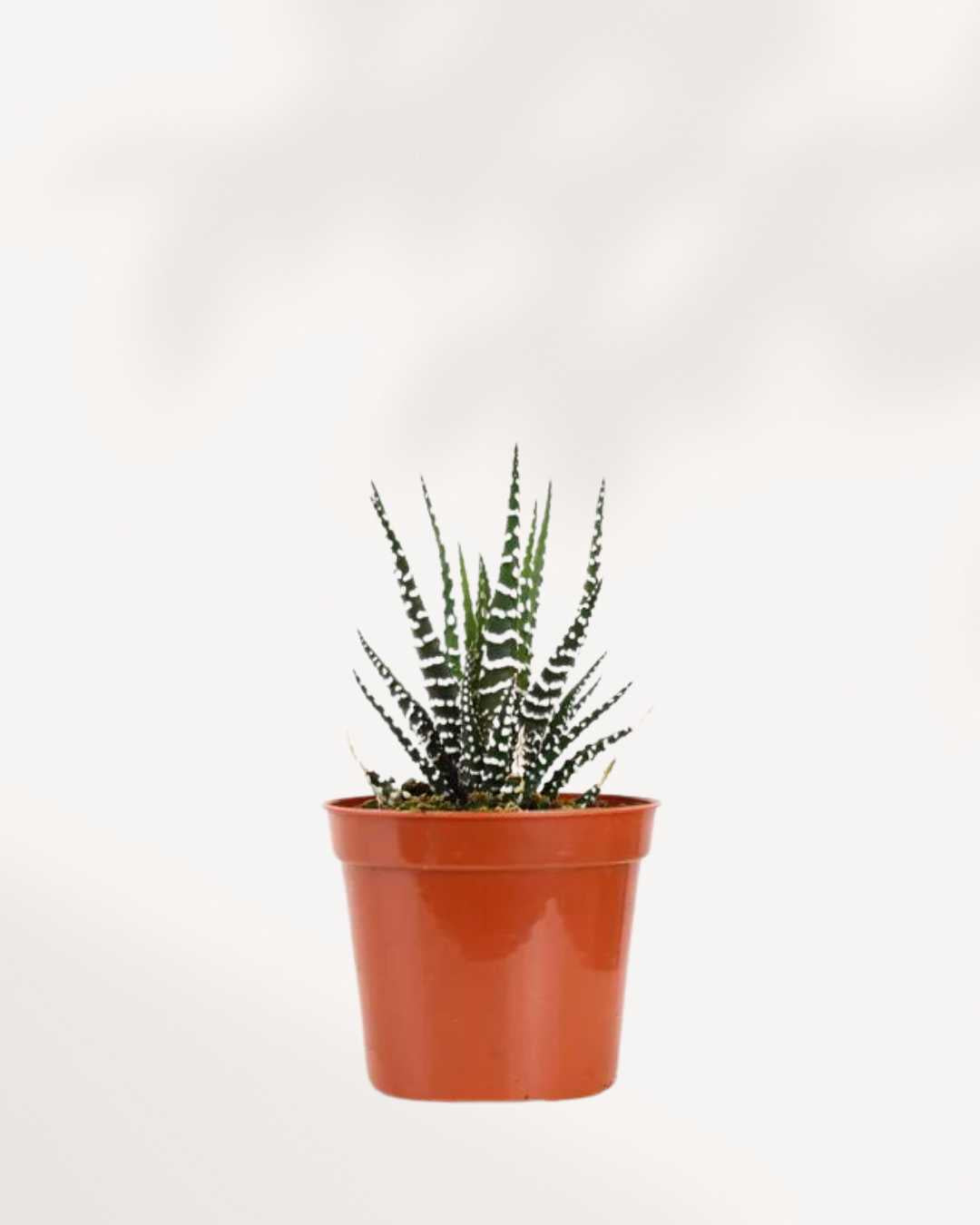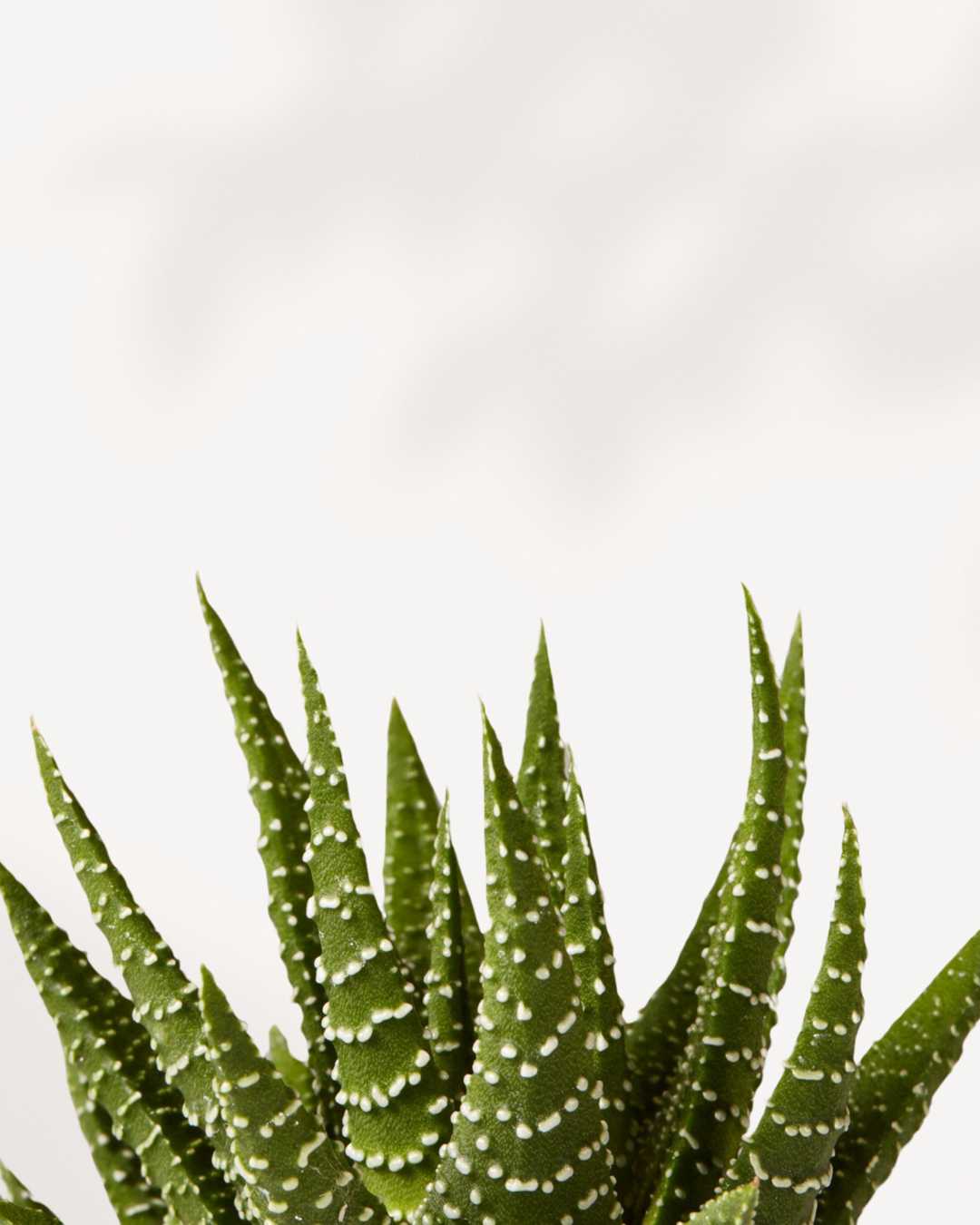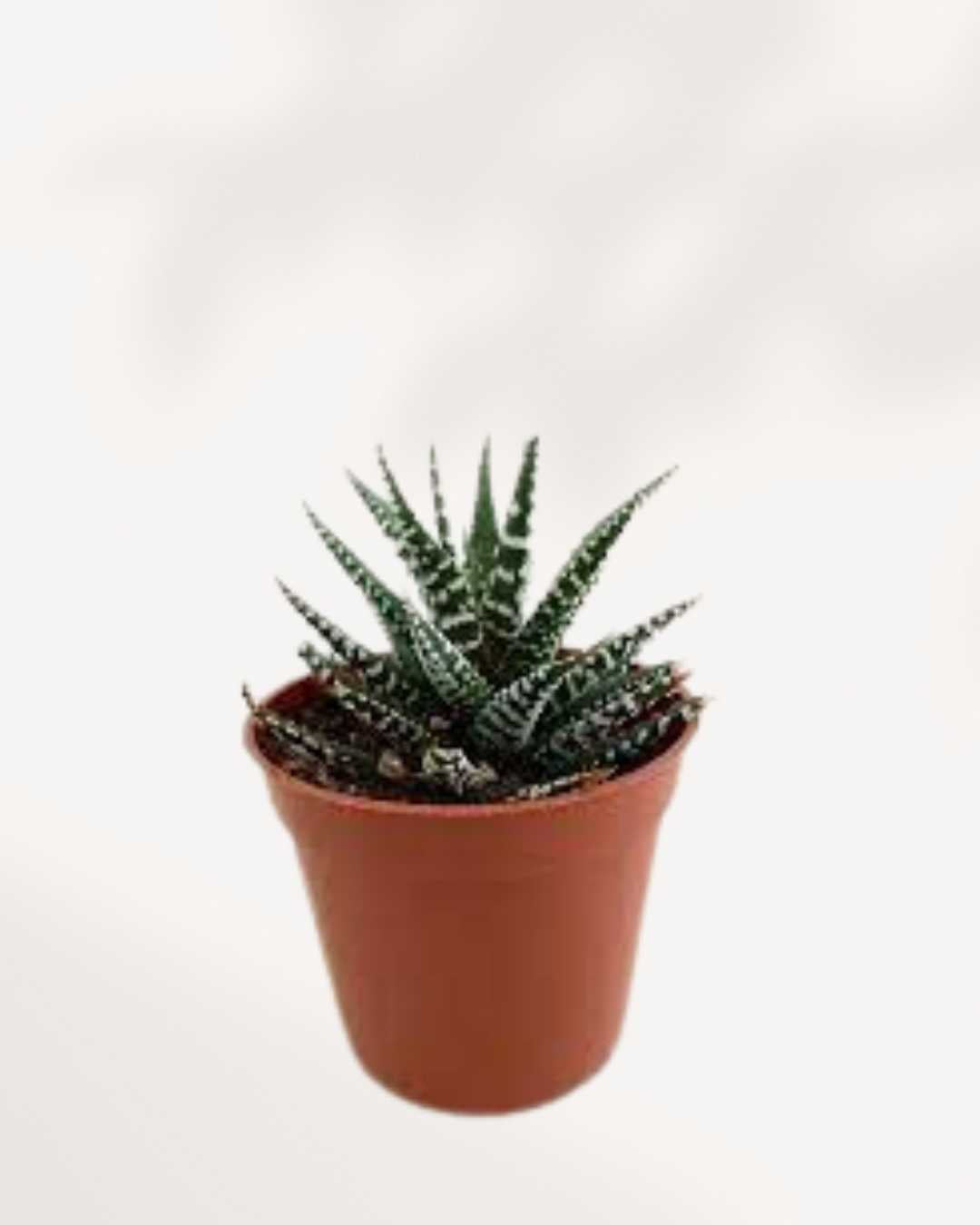Couldn't load pickup availability
Haworthia Succulent, also known as the Zebra Plant, is a compact and low-maintenance succulent admired for its rosette shape and striking patterns. Native to South Africa, it’s a perfect addition to terrariums, desks, and small spaces, making it ideal for indoor plant enthusiasts.
Common Names
- Haworthia
- Zebra Plant
- Haworthia Succulent
Botanical Classification
- Kingdom: Plantae
- Order: Asparagales
- Family: Asphodelaceae
- Genus: Haworthia
- Species: Haworthia spp.
Native Habitat
Haworthia is native to South Africa’s arid regions, where it thrives in rocky, well-drained soils. Its natural drought resistance makes it ideal for indoor environments requiring minimal maintenance.
Historical and Cultural Significance
The Haworthia Succulent has been a staple in succulent collections for decades. Its compact growth habit and distinct appearance symbolize resilience and beauty, making it a favorite for modern interior designs and terrariums.
Uses and Popularity
Haworthia Succulents are widely used as decorative plants due to their compact size and unique patterns. They are perfect for small containers, mixed succulent arrangements, and terrariums, making them highly versatile.
Conservation Status
Haworthia Succulent Plant is not endangered and is widely propagated in nurseries, ensuring its availability for plant enthusiasts.
Description
Physical Characteristics
Haworthia is characterized by fleshy, pointed leaves arranged in a rosette pattern. The leaves often feature white stripes, dots, or translucent windows, enhancing their visual appeal.
Growth Habit
Succulent Haworthia is slow-growing succulent typically reaches a height of 3-5 inches. It produces offsets (pups) around the base, which can be separated for propagation.
Popular Succulent Varieties
Succulent Surprise Box
- A curated collection of unique and popular succulents for plant lovers.
Jade Ovata Shrek
- Features tubular leaves resembling "Shrek" ears, perfect for quirky displays.
String of Pearls
- Trailing stems with bead-like leaves, ideal for hanging baskets.
Living Stone Lithops
- Stone-like succulents ideal for low-water environments and windowsills.
String of Hearts - Pretty Pink
- Trailing, heart-shaped leaves with pink hues, perfect for cascading displays.
Care Guide
Light Requirements
Haworthia thrives in bright, indirect light but can tolerate low-light conditions. Avoid direct sunlight, which may cause leaf scorching. Learn More
Watering Needs
Allow the soil to dry out completely between waterings. Overwatering can lead to root rot, so water sparingly. Indoor Plant Watering
Soil Preferences
Use a well-draining cactus or succulent mix. Adding sand or perlite improves aeration. Indoor Potting Mix
Humidity
Prefers dry conditions and does not require high humidity, making it ideal for indoor spaces.
Common Pests
Mealybugs
Mealybugs may appear as white, cotton-like clusters. Treat with rubbing alcohol or insecticidal soap. Learn More
Spider Mites
Spider mites can cause webbing and leaf discoloration. Treat infestations with neem oil or insecticidal soap. Learn More
FAQs
How often should I water Haworthia?
Water every 2-3 weeks, allowing the soil to dry out completely before the next watering.
Can Haworthia grow in low light?
Yes, it can tolerate low light but thrives best in bright, indirect sunlight.
Is Haworthia pet-friendly?
Yes, it is non-toxic to pets, making it safe for households with animals.
How do I propagate Haworthia?
Propagation is easy through offsets (pups) that grow at the base. Separate and replant in well-draining soil.
How to take care of Haworthia Succulent
Sun: Direct & Indirect
Sun: Direct & Indirect
Light: Medium - Low
Light: Medium - Low
Water: When fully dry
Water: When fully dry
Humidity: Low
Humidity: Low
Pet Friendly: Yes
Pet Friendly: Yes
Pro Tip
Pro Tip
Delivery Policy for Plant Condition
Delivery Policy for Plant Condition
"I have only received part of my order. What to do?
No worries if you've only got part of your order! Our plants come from different nurseries and might arrive in separate shipments, typically 1-2 days apart. It's all part of ensuring your green friends reach you in top-notch condition!
If you do not receive the remaining packages within 48 hours contact support at info@mygreenscape.ca
What is the Life Time Support?
Absolutely! Lifetime support means you can count on us whenever you have questions or uncertainties about your plant. Whether you're puzzled by its behavior or just want to ensure it's thriving, we're here for you. Connect with us on Instagram @mygreenscapeto or shoot us an email at support@mygreenscape.ca.
When it comes to our guarantee for plants shipped with standard or express, rest assured that we offer a 30-day happy healthy plant guarantee on all such shipments. This ensures that your plants are covered for 30 days after delivery, giving you peace of mind regarding their condition. If you have any concerns within this period, feel free to reach out to us for assistance.
For further details, please visit our Local Delivery, Store Pickup, Standard Shipping Guide Page.
What to expect
What to expect
Your plant will arrive in a standard nursery pot, typically 0.5" - 1" smaller than the stated size to seamlessly fit into your chosen decorative pot. Washable Paper Planter Bags are available for separate purchase.
Just like nature intended, each plant is unique, showcasing natural variations in size, shape, and characteristics. Our commitment is to deliver a plant that closely resembles the one featured on our website, matching your chosen size, and with the potential to thrive happily in your home.
Frequently Asked Questions
Frequently Asked Questions
Certainly! If you're pondering about ordering plants online, you're not alone. We've compiled the most frequently asked questions. Check out our FAQ section here for quick answers! Happy planting!
Plant & Pot Size Chart
Plant & Pot Size Chart
Choosing the right pot size for your plants can be a daunting task, especially if you're new to gardening. But fear not! Our pot sizes chart can help you find the perfect match for your plants, ensuring they have enough space to grow and thrive. With our guide, you'll be able to confidently choose the right pot size and plant variety for your gardening needs.
Plant Pot Size Guide.

| Extra Small | 7-10 cm | 2.5 - 3 inches |
| Small | 11-12 cm | 3.5 - 4 inches |
| Medium | 14-17 cm | 5 - 6 inches |
| Large | 19-21 cm | 8 - 10 inches |
| Extra Large | 24-27 cm | 12 - 14 inches |
All sizes are specified in product details.
Your Complete Guide to Pot Sizes: What Size Should You Choose?

When selecting a pot for your plant, it's important to find the right size. But with all the different options out there, how do you know which one is best? We're here to help!
MyGreenscape's pot sizes chart is a great resource for finding your perfect fit. Our easy-to-read chart takes out all the guesswork and helps you quickly choose the right size for your plant.
Smaller pots are best for seedlings or small plants just starting out. These tend to be shallow but wide, allowing enough room for the roots of the young plant but not too much where they get overcrowded. Medium-sized pots are ideal when your plant has grown from its infancy and is ready for more space. These are deeper and wider than small pots, so that it can accommodate larger root systems - making sure your plant gets enough nourishment while still giving it breathing room. Large pots are top choice if you have an established plant in need of lots of space - think trees and large shrubs! The spacious depth and width allow plenty of room for deep root systems without struggling for air or light.
No matter what size you choose, MyGreenscape has got you covered, with our pot sizes chart guaranteeing you find the perfect fit every time!
Winter Shipping Protection
Winter Shipping Protection
We take extra care with each package during the colder months. For destinations experiencing cold weather, we provide insulated packaging and heat packs as needed to protect your plants from freezing temperatures. With Winter Shipping Protection, your plants are equipped to arrive safe and sound, even in winter’s chill.
Care Guide
Care Guide
Explore essential care tips. check out our Comprehensive Resource for Indoor Plant Care.



WATERING MADE EASY
Check soil moisture before watering and use a potting mix that drains well. It’s the secret to healthy, happy plants!
Hear From Happy Plant Parents.
Who have brought Mygreenscape plants into their homes.







